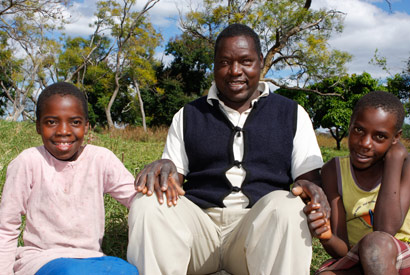
Shabby with his children Holiness and Universe Wakinji
“I was born with sight, but smallpox made me blind at the age of seven,” explains Shabby Aongola. “The government don’t take care of disabled people here in Zambia, many end up begging. That’s why I helped the church to set up this community for the those with physical disabilities, so that we could help each other and share our resources.”
Shabby lives his blind wife and five children in a small compound of traditional huts next door to Simakakata school. There are ten families here, and most of the adults have been afflicted by illnesses which are all but eradicated in the West. Many have been blinded by diseases like smallpox or trachoma, others have the crippled limbs which are a hallmark of childhood polio.
Two of Shabby’s daughters, Holiness and Universe Wakwinji, are enrolled at Simakakata, along with 11 other children from families who live here. Having the school close by is essential to the future of these families, argues Shabby, because if it wasn’t here the children would have no chance of being educated at all.
“Many of us could not send our children (7km) away to school in Kalomo,” he says, “Because we need them to help at home. If they had to spend all day walking to school, then many of the people here would have to follow them and sit and beg in the streets.”
With a good education, the children here will stand more chance of going on to earn enough to look after their disabled parents later in life.
Shabby works tirelessly: not only was he instrumental in setting up both the disabled community and the school, he currently sits on the Parent Teachers Association and manages to be self-sufficient when it comes to food, using a system of strings and markers to help him plant corn in straight lines. Some of the families who live here are totally reliant on help from the church and other NGOs for basic survival, though, and even Shabby has no extra income to help the school.
If the people of Simakakata can build a new school building, then they will be able to attract government funding. Primary education is provided free of charge in Zambia, but only if children are able to attend a government school.
“We need to build a better schoolhouse, and lodging for teachers too.” he explains, “The blind community cannot afford even the small fees which have to be charged to pay for food for the volunteer teachers. Once we have a proper school which we can prove will not vanish tomorrow, the government will be able to send more teachers and no-one will have to pay.”



